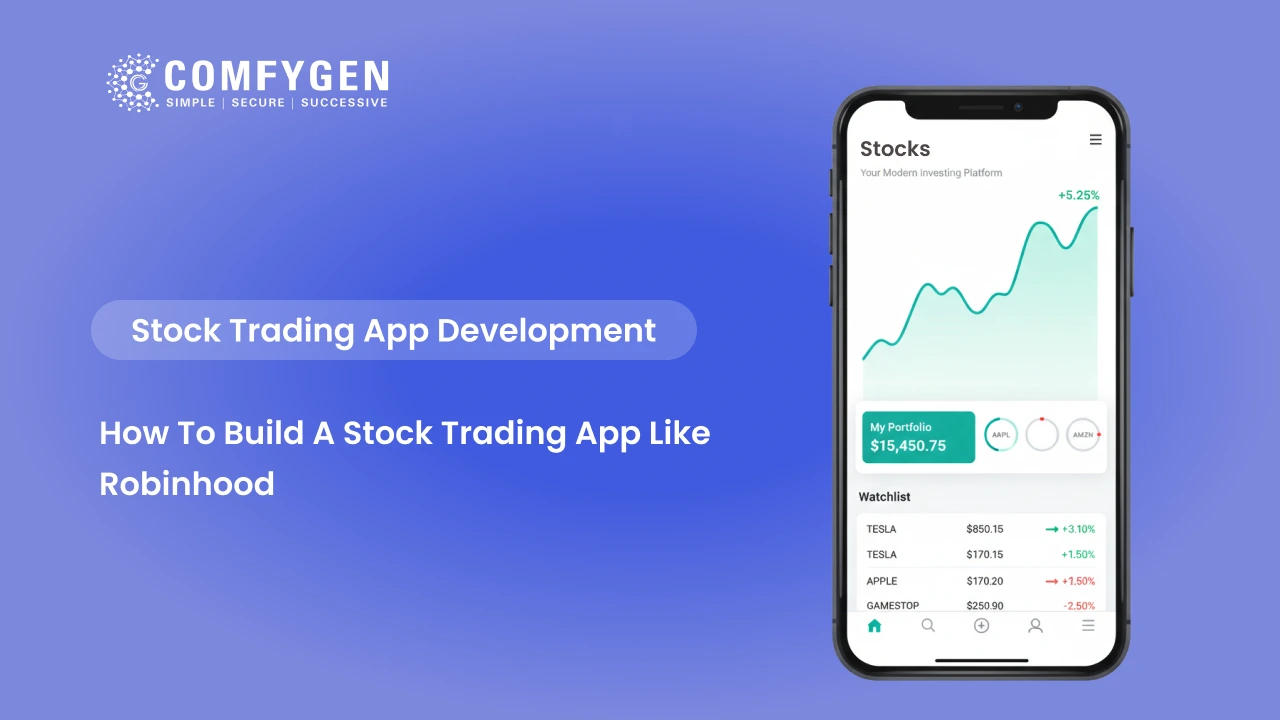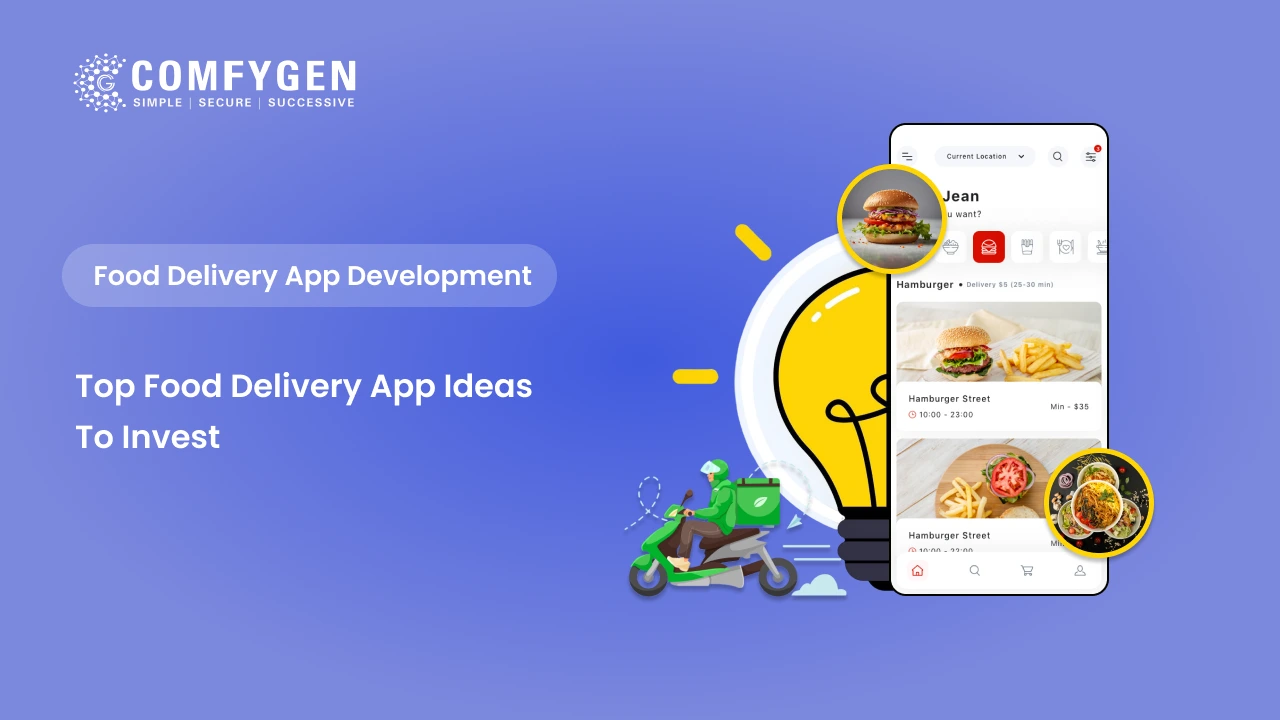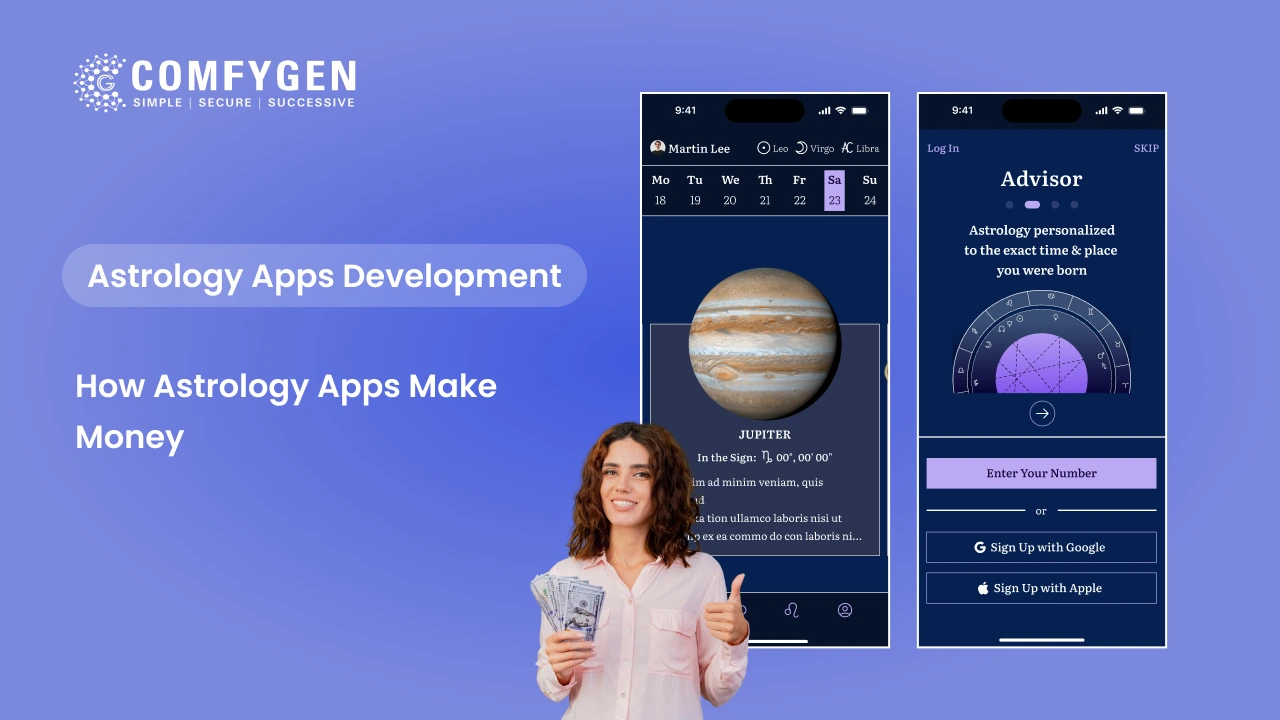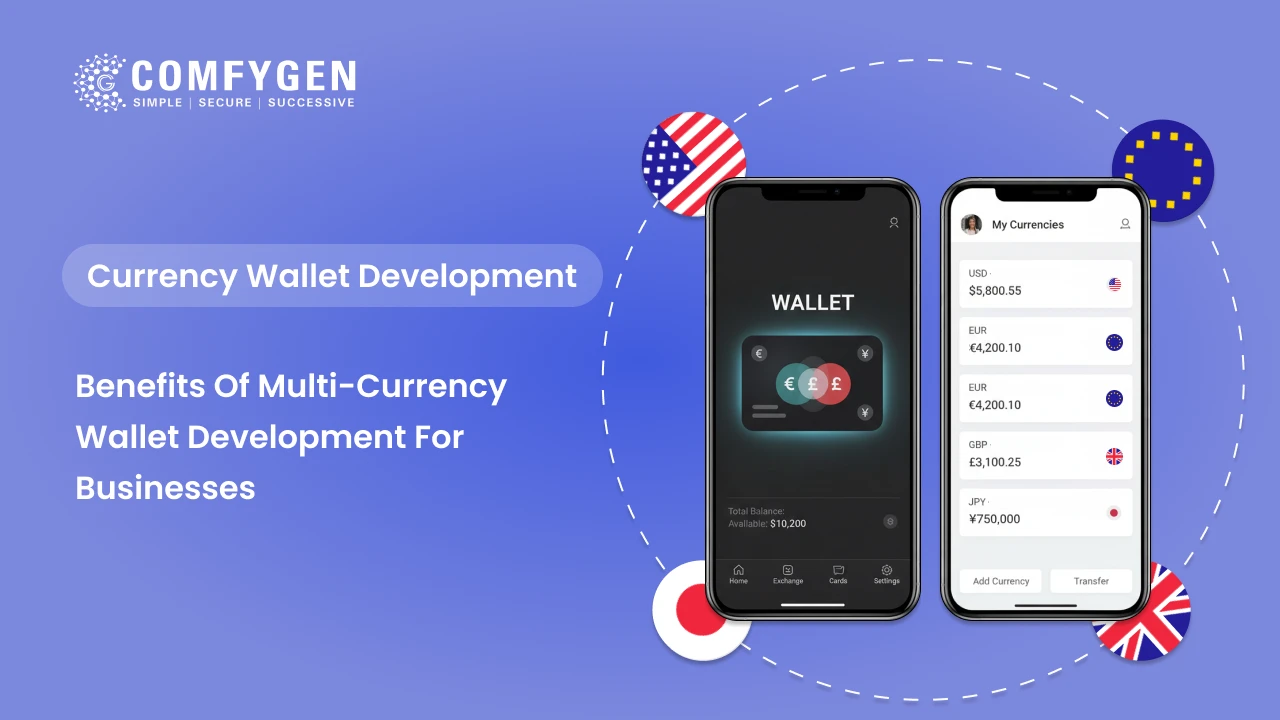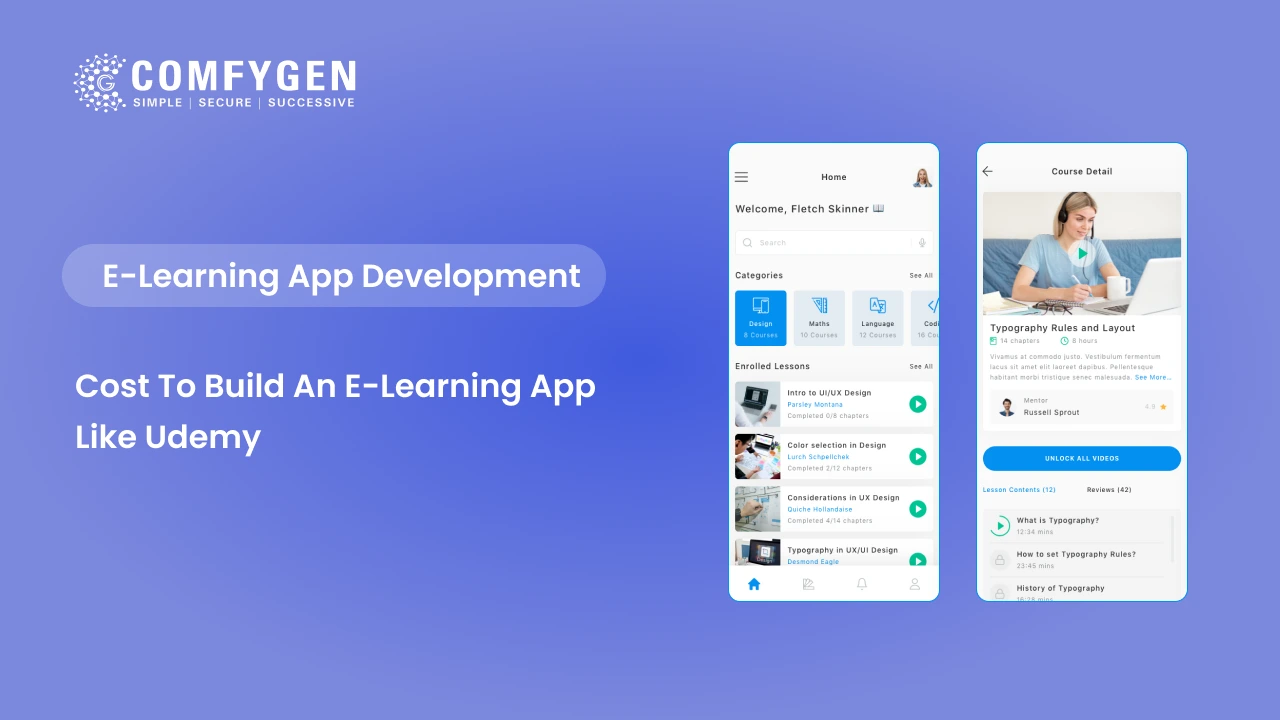How to Build a Stock Trading App like Robinhood
The demand for stock trading app like Robinhood has skyrocketed as more people invest in stocks, ETFs, and cryptocurrencies through their smartphones. Apps like Robinhood have revolutionized the trading world by offering commission-free trading, a user-friendly design, and real-time market access.
If you plan to build a stock trading app like Robinhood, this guide will outline the complete process, required features, technologies, costs, and monetization strategies.
What is a Stock Trading App like Robinhood?
A stock trading app like Robinhood is a fintech application that allows users to buy, sell, and monitor stocks without paying traditional brokerage fees. Unlike old trading platforms, Robinhood offers a commission-free model, easy onboarding, instant deposits, and a smooth interface that attracts beginners as well as experienced traders.
Market Scope & Growth of Stock Trading Apps
The global stock trading app market is expanding rapidly. According to reports, fintech and trading apps are expected to grow significantly in the next five years due to:
- Rising demand for commission-free trading apps
- Increased adoption of mobile-first investment solutions
- Integration of AI and blockchain in fintech apps
This makes it the perfect time to develop a stock trading app like Robinhood for startups, brokers, and fintech companies.
Key Features of a Stock Trading App like Robinhood
Building a successful stock trading app like Robinhood requires a mix of user-friendly design, advanced technology, and strong security. Below are the must-have features every stock trading app development company should include:
Easy Onboarding & KYC Verification
The first impression matters. A smooth onboarding process helps users quickly sign up and start trading. With AI-powered KYC verification, users can upload documents, verify their identity, and access the app in just a few minutes.
This builds trust and provide compliance with financial regulations.
Real-Time Stock Trading
For traders, speed is everything. The app must offer real-time market data, live stock prices, and instant order execution.
Integrating APIs like IEX Cloud or Alpha Vantage ensures users never miss a trading opportunity and can buy or sell instantly.
Commission-Free Trading Model
Robinhood became popular by introducing commission-free trading. Users love trading without hidden fees or extra charges.
Offering a similar zero-commission trading model can help your app attract beginners and experienced investors who want to save on brokerage fees.
Smart Portfolio Management
A successful trading app like Robinhood should provide users with a complete view of their investments.
Features like portfolio tracking, investment performance analysis, and diversification insights allow traders to manage stocks, ETFs, and crypto in one place.
Personalized Notifications & Alerts
Timely updates play a big role in trading decisions. Push notifications can alert users about stock price changes, market news, or order execution.
Adding AI-driven personalized alerts makes the app more engaging and keeps users active.
Advanced Security & Data Protection
Security is the backbone of any fintech app development. To protect sensitive financial data, your app must include two-factor authentication (2FA), biometric login, encryption, and fraud detection systems. This ensures safe transactions and builds user confidence.
In-App Market Insights & Analytics
Modern traders don’t just want to trade; they want to make smart decisions. By offering AI-based analytics, trading charts, market trends, and reports, you empower users with knowledge. This feature makes your app not just a trading platform but also an investment advisor.
Want to Develop the Best Stock Market
App Like Robinhood?
Let’s Connect
How to Build an Stock Trading App like Robinhood?
Building a stock trading app like Robinhood requires careful planning, advanced technology, and strict financial compliance. Here’s a detailed step-by-step investment app development process every business should follow before launching a trading app.
Conduct Market Research & Competitor Analysis
Before starting stock trading mobile app development, it’s essential to study the stock trading app market. Analyze popular stock market apps like Robinhood, E*TRADE, and Webull to understand what works and what doesn’t.
Identify user pain points, trending features, and market opportunities.
This helps you define a clear vision for your stock trading app and stand out from competitors.
Define Your Business Model
Choosing the right business model for stock trading app development is the foundation of success.
You can go for a commission-free model like Robinhood, a subscription-based model offering premium features, or a hybrid model that combines both.
Defining your revenue streams early ensures your app stays profitable in the long run.
Technology Stack for Developing a Robinhood-Like App
Our robust technology stack provides security and scalability:
- Frontend: React Native, Flutter, Swift, Kotlin
- Backend: Node.js, Python, Java
- APIs: Plaid, Yahoo Finance, Alpha Vantage, IEX Cloud
- Database: PostgreSQL, MongoDB
- Cloud: AWS, Google Cloud, Microsoft Azure
Focus on UI/UX Design for building a Stock Trading App Like Robinhood
A trading app like Robinhood became successful because of its clean, beginner-friendly design. Your trading app must be simple, intuitive, and visually appealing. Traders should be able to buy or sell stocks in a few clicks without confusion.
Clear dashboards, easy navigation, and interactive charts can boost user engagement and retention.
Integrate Brokerage & Market APIs
To allow real-time stock trading, your app needs brokerage and financial data integrations. APIs like Plaid, Alpha Vantage, and Yahoo Finance help with bank account linking, stock quotes, and financial insights.
Brokerage integration ensures users can trade seamlessly without leaving your app.
Integrate Compliance & Licensing into Trading App Development
Stock trading is heavily regulated. To build a Robinhood-like app, you must comply with financial authorities like SEC and FINRA in the USA or respective local regulators in your region.
Global compliance with GDPR for data privacy and PCI-DSS for payment security is also crucial. Without proper licenses, your app cannot operate legally.
Implement Strong Security Features
Security is the backbone of any fintech app development. Your app must include multi-factor authentication, biometric login, data encryption, and fraud detection systems.
Protecting user funds and sensitive data builds trust and ensures long-term success in the competitive stock trading industry.
Testing the Stock Trading App
Conduct extensive testing before launching the app to ensure it runs smoothly in all situations.
- Functional Testing: Checks if every feature works as expected.
- Performance Testing: Ensures the app performs well under heavy traffic.
- Security Testing: Identifies and fixes vulnerabilities.
- User Testing: Collects feedback from beta users for improvements.
Launch the App
You can launch your app on Google Play Store and Apple App Store once testing is complete. Early users need a strong marketing strategy, which may include social media campaigns, referral bonuses, and partnerships. After launch, monitor user behavior, track feedback, and roll out updates regularly.
Post-Launch Maintenance & Support
Launching is just the beginning. To stay competitive, provide continuous support, bug fixing, feature upgrades, and security patches. Adding new features like crypto trading, AI robo-advisors, and social trading tools can help you retain users and grow your audience.
Regulatory Compliance & Security in Stock Trading App Development
When you plan to build a stock trading app like Robinhood, one of the most critical aspects is following financial regulations and ensuring top-notch security.
Unlike regular mobile apps, trading apps handle sensitive financial data, real-time transactions, and user investments. Any breach of security or non-compliance can result in legal issues and loss of user trust.
Compliance with Financial Authorities
Every country has its own financial regulators. For example, in the USA, you must comply with SEC (Securities and Exchange Commission) and FINRA (Financial Industry Regulatory Authority) guidelines.
These regulations ensure that your trading app operates legally, protects investors, and maintains transparency in stock trading activities.
Data Privacy Regulations
User data security is as important as financial compliance. Your app should follow global privacy laws such as GDPR (General Data Protection Regulation) in Europe and CCPA (California Consumer Privacy Act) in the USA.
These frameworks define how user information is collected, stored, and shared. Strict adherence helps build customer trust and prevents costly penalties.
Payment & Transaction Security
Since trading apps involve money transfers, deposits, and withdrawals, compliance with PCI-DSS (Payment Card Industry Data Security Standard) is mandatory. This ensures that all payment transactions are encrypted and protected against fraud.
Strong Authentication Mechanisms
To safeguard accounts, your app must integrate two-factor authentication (2FA), biometric logins (fingerprint or face recognition), and OTP-based verification. These measures prevent unauthorized access and add an extra security layer.
Data Encryption & Fraud Prevention
All user data, including banking details and trading history, should be protected using end-to-end encryption protocols (AES-256, SSL certificates).
Additionally, fraud detection algorithms powered by AI and machine learning can identify suspicious activities and block potential threats in real time.
Why Compliance & Security Matter?
- Builds trust and credibility among traders and investors
- Protects sensitive financial and personal data
- Prevents regulatory penalties and lawsuits
- Ensures long-term success of your fintech app in a competitive market
How Much Does It Cost to Build a Stock Trading App Like Robinhood?
The cost of developing a stock trading app like Robinhood depends on several factors such as app features, design complexity, technology stack, compliance, and the region where the app is developed.
Since a stock trading mobile app involves sensitive data, strict security, and real-time trading features, the stock trading app development cost is higher compared to regular apps.
Key Factors That Affect Stock Trading App Development Cost
Features & Functionalities
- A basic app with simple trading features will cost less, while advanced features like real-time analytics, robo-advisors, and AI-powered recommendations increase the overall cost.
- Must-have features include onboarding & KYC, stock buying/selling, payment integration, push notifications, and security protocols.
Platform (iOS, Android, or Cross-Platform)
- Developing for a single platform (either iOS or Android) reduces cost, but targeting both platforms ensures a larger user base.
- Cross-platform development using Flutter or React Native is a cost-effective option.
Stock Trading App Development Region
The cost to create a stock trading app varies based on developer hourly rates. For example:
- India & Asia: $30 – $60/hour (affordable and high-quality development)
- Eastern Europe: $60 – $90/hour
- USA & Western Europe: $100 – $200/hour
Security & Compliance Integrations
Since stock trading apps must follow SEC, FINRA, GDPR, and PCI-DSS regulations, implementing advanced security features like end-to-end encryption, 2FA, and fraud detection adds to the development cost but ensures user trust and safety.
UI/UX Design & User Experience
A Robinhood-like app became popular because of its clean, easy-to-use interface. Investing in modern UI/UX design, interactive charts, and smooth navigation improves user engagement but also impacts the overall trading app development cost.
Estimated Cost to Build an App Like Robinhood
On average, the cost to build a stock trading app like Robinhood ranges between $30,000 – $150,000, depending on complexity and features.
- Basic Stock Trading App → $30,000 – $50,000
- Mid-Level App with Analytics & Secure Payments → $60,000 – $100,000
- Advanced Robinhood-Style App with AI & Blockchain Integration → $120,000 – $150,000+
Additionally, businesses should consider annual maintenance costs (15–20%), which include updates, security patches, bug fixing, and new feature integration.
Why Investing in a Robinhood-Like App is Worth It
Even though the initial stock trading app development cost is high, the return on investment is significant. A well-developed trading app can:
- Attract thousands of active traders
- Generate revenue through subscriptions, payment for order flow, or premium features
- Build long-term brand credibility in the growing fintech app market
Ready to Build Your Own
Commission-free Trading App?
Let’s Discuss
Future Trends in Stock Trading App Development
The future of stock trading apps looks promising as new technologies are transforming how people invest and trade.
Just like Robinhood reshaped the market with commission-free trading, the next generation of apps will focus on personalization, automation, and security.
If you are planning to develop a stock trading app like Robinhood, here are the upcoming trends you should know:
AI-Powered Robo-Advisors
Artificial Intelligence is revolutionizing the investment world. AI-powered robo-advisors provide automated portfolio management, personalized stock suggestions, and risk analysis based on user behavior.
This trend allows beginners to start trading confidently while giving experienced traders smarter insights. Integrating AI in your stock trading app development can improve user engagement and retention.
Blockchain & Crypto Trading
Blockchain development provide secure, transparent, and tamper-proof transactions, making it one of the top trends in fintech. Many investors are now diversifying into cryptocurrencies along with traditional stocks.
By integrating crypto trading bot features into your Robinhood-like app, you can attract a larger audience that seeks both stock and digital asset trading in one platform.
Social Trading Features
Modern traders don’t just want tools; they want community-driven trading experiences. Social trading allows users to follow top investors, copy their strategies, and share insights within the app.
Adding these features makes your trading app like Robinhood more interactive and appealing to Gen Z and millennial investors who value collaboration.
Voice-Enabled Trading
With advancements in AI voice assistants, traders will soon be able to buy or sell stocks using simple voice commands. Voice-enabled trading apps improve accessibility, speed, and convenience.
Imagine saying, “Buy 5 shares of Tesla” and completing the trade instantly. This trend can make your app stand out in the competitive stock trading app market.
Advanced Analytics & Big Data
Big Data combined with predictive analytics is helping traders make data-driven decisions.
By offering real-time dashboards, price predictions, and investment forecasts, your app can serve as more than just a trading tool—it becomes a personal financial advisor.
Cloud-Based Scalability
As the number of traders continues to grow, cloud computing ensures apps handle massive trading volumes without downtime.
Cloud integration also reduces infrastructure costs and keeps your app scalable for future growth.
Conclusion
Developing a stock trading app like Robinhood can be a highly profitable venture if done right. By focusing on user-friendly design, regulatory compliance, robust security, and innovative features, you can create a competitive fintech solution. Partnering with a trusted stock trading app development company ensures faster commission-free trading app development, cost efficiency, and long-term success in the fintech market.
FAQs
How much does it cost to build an AI-powered stock trading app?
How long does it take to develop a stock trading app?
Which technology stack is best for stock trading app development?
How can I make my stock trading app secure?

Mr. Saddam Husen, (CTO)
Mr. Saddam Husen, CTO at Comfygen, is a renowned Blockchain expert and IT consultant with extensive experience in blockchain development, crypto wallets, DeFi, ICOs, and smart contracts. Passionate about digital transformation, he helps businesses harness blockchain technology’s potential, driving innovation and enhancing IT infrastructure for global success.
Based on Interest
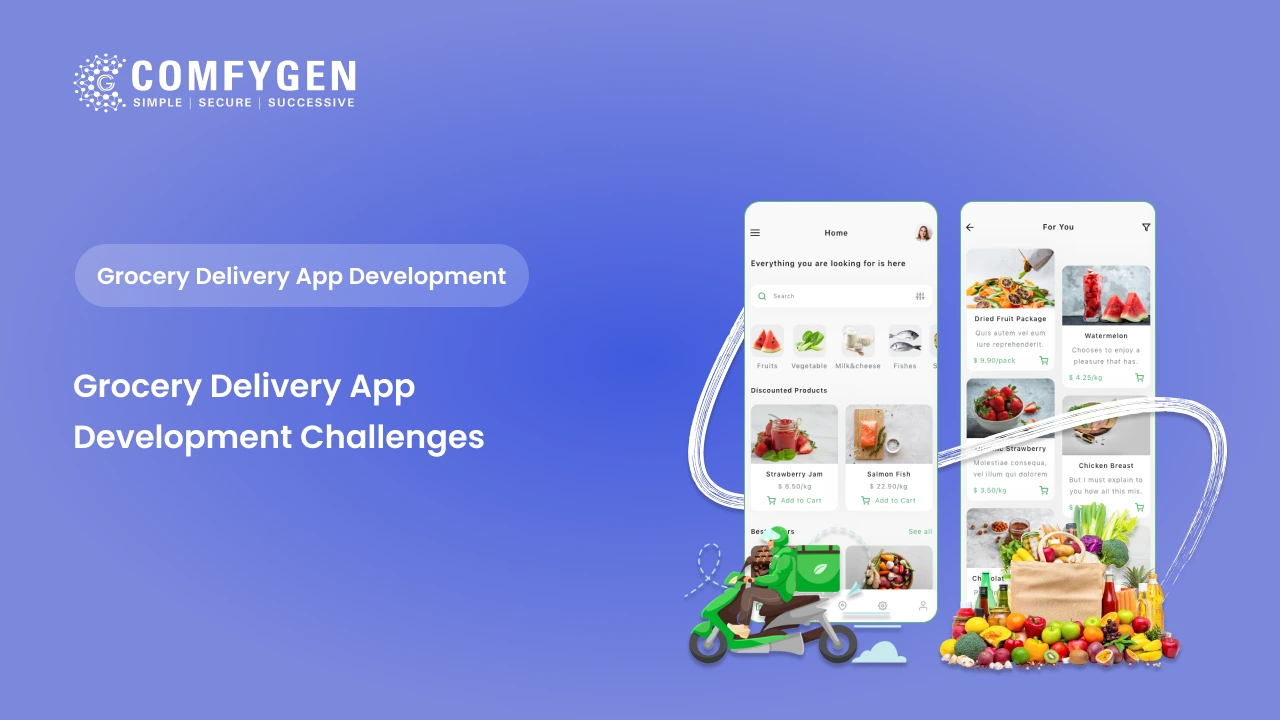
Grocery Delivery App Development Challenges: Common Problems and How to Overcome Them
In today's fast-paced digital age, the online grocery delivery industry is experiencing significant growth. With consumers preferring doorstep facilities over traditional shopping,…

